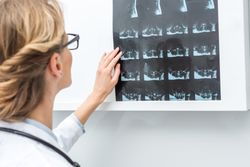What's the Difference Between Osteoporosis & Osteopenia?
By OsteoStrong

Bone density testing can diagnose conditions like osteoporosis and osteopenia, both of which can have a significant impact on quality of life. The sooner you receive a diagnosis, the faster you can find a suitable treatment to prevent symptoms from worsening. Here’s what you need to know about these two diseases.
How to Interpret Bone Density Tests
Bone density testing determines the health of your bones, usually taking place every one to two years for people who are 65 or older. Medical professionals use X-rays, which capture an image of the bones. They measure density using T-scores; normal bone density scores are higher than -1. Scores that range between -1 to -2.5 point to diminished bone density, also known as osteopenia. Osteoporosis occurs when the score is lower than -2.5.
Understanding Osteoporosis
 A healthy body constantly regenerates bone tissue. In a person with osteoporosis, bone tissue dies off at a faster rate than the body can replace it. Both men and women can experience this disease, but women are more likely to develop this condition after menopause. The disease is often linked to fluctuating hormone levels, but it can also stem from a medical condition or a lack of calcium in one’s diet. Hormone therapy can benefit some patients, but some medications reduce the risk of a broken bone.
A healthy body constantly regenerates bone tissue. In a person with osteoporosis, bone tissue dies off at a faster rate than the body can replace it. Both men and women can experience this disease, but women are more likely to develop this condition after menopause. The disease is often linked to fluctuating hormone levels, but it can also stem from a medical condition or a lack of calcium in one’s diet. Hormone therapy can benefit some patients, but some medications reduce the risk of a broken bone.
Understanding Osteopenia
A person with osteopenia has a low bone density score but falls short of having osteoporosis. At this point, it’s possible to prevent more damaging effects from developing by changing parts of your lifestyle. For example, increasing your intake of foods rich in calcium can help boost bone density. Milk and dairy products, spinach, certain types of fish, and beans are all excellent sources of dietary calcium. You can also undergo impact treatment to strengthen your bones.
If you’re troubled by the results of a recent bone density test, OsteoStrong of O'Fallon, MO, has the solution for you. This one-of-a-kind fitness facility uses advanced musculoskeletal equipment to facilitate the regrowth of bone without risking injury. For people with osteoporosis, this therapy can supplement other treatments, while those with osteopenia may prevent more serious issues from occurring. Therapeutic sessions can also reduce back and neck pain and improve balance and posture. Visit the website for more information, or call (636) 238-8696 to schedule a session.
About the Business
Have a question? Ask the experts!
Send your question

